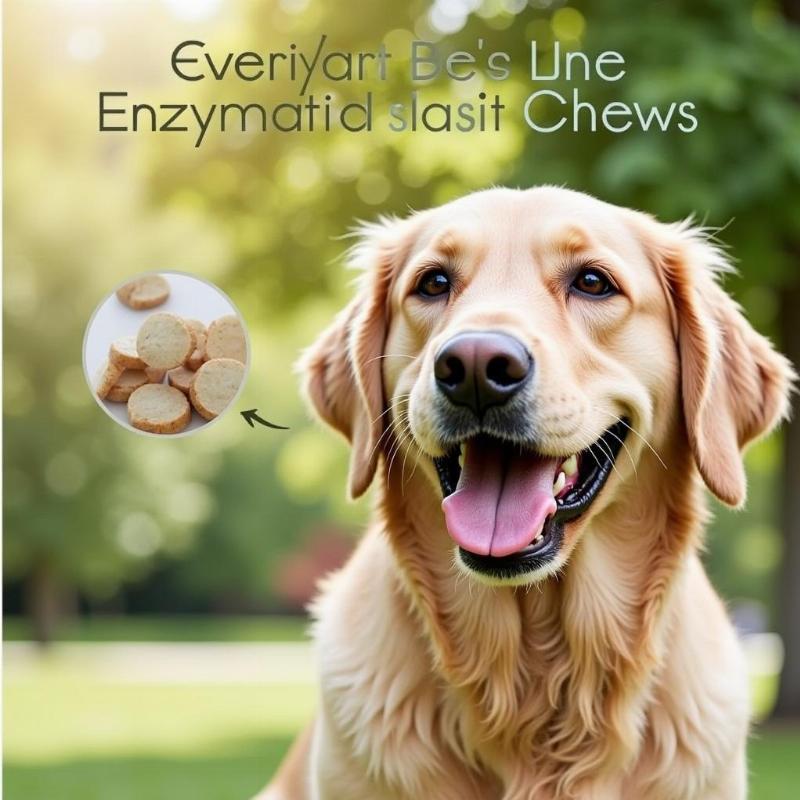Enzymatic dental chews for dogs offer a convenient and appealing way to improve your furry friend’s dental hygiene. These chews aren’t just tasty treats; they’re designed to combat plaque and tartar buildup, freshen breath, and promote overall oral health. But with so many options available, choosing the right chew for your dog can be challenging. This comprehensive guide will explore the benefits of enzymatic dental chews, help you select the perfect chew for your dog’s needs, and answer your most pressing questions about canine dental care.
Understanding the Power of Enzymatic Dental Chews
Enzymatic dental chews work differently than regular dog treats. They contain specific enzymes, like glucose oxidase and lysozyme, that break down the bacteria responsible for plaque and bad breath. As your dog chews, the abrasive texture of the chew helps to mechanically scrub away plaque and tartar, reaching even those hard-to-reach areas. This dual-action approach makes enzymatic chews a powerful tool in preventing dental disease.
 Hình ảnh chó đang nhai xương gặm răng enzyme
Hình ảnh chó đang nhai xương gặm răng enzyme
Choosing the Right Enzymatic Chew for Your Dog
Selecting the right enzymatic chew is crucial for maximizing its effectiveness and ensuring your dog’s safety. Consider the following factors:
- Size and Breed: Choose a chew that’s appropriately sized for your dog. Smaller breeds require smaller chews to prevent choking hazards. Larger breeds benefit from larger, more durable chews.
- Age: Puppies and senior dogs may have different chewing needs. Puppies need softer chews that are gentle on their developing teeth, while seniors might require softer options due to potential dental issues.
- Ingredients: Look for chews made with natural, digestible ingredients. Avoid artificial flavors, colors, and preservatives. Check for potential allergens, especially if your dog has sensitivities.
- Veterinarian Recommendations: Consult your veterinarian for personalized recommendations based on your dog’s specific health needs and any existing dental conditions.
How Often Should You Give Your Dog Enzymatic Chews?
Most manufacturers recommend giving your dog an enzymatic chew daily. However, always follow the specific instructions on the product packaging. Overfeeding can lead to digestive upset or weight gain. how often to clean dogs teeth provides additional information on maintaining your dog’s dental health.
Beyond Chews: A Holistic Approach to Dental Care
Enzymatic chews are a great addition to your dog’s dental hygiene routine, but they shouldn’t be the only measure. Regular brushing with petrodex enzymatic toothpaste for dogs remains the gold standard for preventing dental disease. clean teeth gel for dogs can also be a beneficial supplement. Professional dental cleanings by a veterinarian are crucial for addressing existing dental problems and ensuring comprehensive oral health. how often should dogs get their teeth cleaned offers guidance on the frequency of professional cleanings. If cost is a concern, explore affordable teeth cleaning for dogs options.
Are Enzymatic Chews Right for My Dog?
Dr. Emily Carter, DVM, a leading veterinary dentist in Los Angeles, advises, “Enzymatic chews are a safe and effective way to support your dog’s oral health, particularly for dogs who resist traditional brushing.”
Dr. Sarah Miller, DVM, another prominent veterinary professional, adds, “The right chew can make a significant difference in preventing plaque and tartar buildup, ultimately improving your dog’s overall well-being.”
Conclusion
Enzymatic dental chews for dogs are a valuable tool in promoting good oral hygiene. By understanding the benefits, selecting the right chew, and incorporating them into a comprehensive dental care routine, you can help your dog maintain a healthy smile and prevent dental disease. Remember to consult your veterinarian for personalized advice and ensure you’re providing the best possible care for your furry companion.
FAQ
- Do enzymatic chews replace brushing? No, brushing remains the most effective method for removing plaque and tartar. Enzymatic chews are a supplementary tool.
- Can puppies have enzymatic chews? Yes, but choose puppy-specific chews designed for their developing teeth.
- Are enzymatic chews safe for all dogs? Generally, yes. However, consult your vet if your dog has any allergies or pre-existing health conditions.
- How long does it take for enzymatic chews to work? You may start to notice fresher breath within a few days, but significant improvements in plaque and tartar reduction can take several weeks.
- What if my dog doesn’t like enzymatic chews? Try different flavors and textures until you find one your dog enjoys.
- Can I give my dog too many enzymatic chews? Yes, follow the recommended dosage on the packaging to avoid digestive upset or weight gain.
- Are enzymatic chews expensive? The price varies depending on the brand and size. However, they are a cost-effective way to support your dog’s dental health and potentially prevent costly dental procedures in the future.
Beautdogs.us is your premier destination for all things dog-related in the US. We offer expert advice on dog breeds, grooming, nutrition, and overall wellness, providing a trusted resource for both new and experienced dog owners. For personalized support and access to a wealth of information, reach out to our team at [email protected] or call us at +1 501-555-7529. Visit Beautdogs.us today!